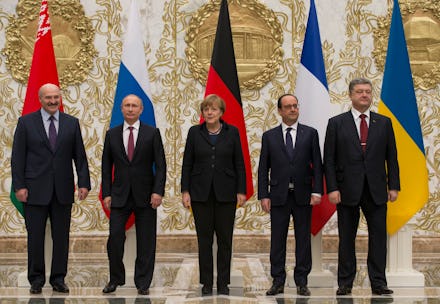Ukraine and Russia Reach Cease-Fire After Marathon Night of Negotiations

The news: After more than 16 hours of "marathon" talk overnight, Germany, France, Russia and Ukraine reached a cease-fire Thursday that will tentatively end the conflict between Ukraine and Russia that recently reached an all-time high point of tension.
German Chancellor Angela Merkel, Ukrainian President Petro Poroshenko, French President Francois Hollande and Russian President Vladimir Putin reached the agreement after a "marathon 16-hour talks" or negotiations, the Associated Press reports, resulting in a deal that will go into effect midnight local time Sunday, or 5 p.m. Eastern time Saturday.
"We now have a glimmer of hope," Merkel said in an official statement. "But the concrete steps must of course be gone, and there are still major hurdles [that] lie ahead. But in the balance, I can say that what we have achieved so much more hope there than if we had achieved nothing."
The deal: Immediately, along with the cease-fire, all heavy weaponry is to be removed from the front-lines of the Ukraine-Russia conflict. The agreement also creates a "demarcation line" that will separate Ukrainian forces from separatists fighters, Reuters reports.
The deal also required Ukrainian parliament to afford the country's eastern region greater constitutional autonomy in exchange for reinstating Ukrainian control of the Russia border by the end of the year. However, the Associated Press reports that Poroshenko denied any "agreement on any autonomy or federalization for eastern Ukraine."
This is just one of the sticking points that's caused concern over the implementation of the deal. Though the parties reached a deal in theory, factors like control and autonomy of eastern Ukraine will likely continue to be embroiled for the next several months.
Additionally, the Associated Press reports that even the implementation of the cease-fire itself remains questionable. Poroshenko emphasized the deal contains a "clear commitment to withdraw all foreign troops, all mercenaries from the territory of Ukraine," which is referring to the armies of Russian soldiers that have been backing the separatists forces in eastern Ukraine since the conflict began as far back as February 2014.
Reactions: No one is coming out of the negotiations particularly happy, but considering that days ago state officials warned of a ""dramatic spiral' that renders peace impossible," this is a major step that will hopefully lead to regional stabilization, despite its shortcomings.
"It was not the best night in my life, but the morning, I think, is good because we have managed to agree on the main things despite all the difficulties of the negotiations," Putin said, according to the New York Times.
Merkel agreed that the deal isn't perfect, but will be an important step toward peace.
"I have no illusions, we have no illusions. A great, great deal of work is still necessary. But there is a real chance to make things better," she said, according to the New York Times.
The deal will also include provisions to recontinue the economic and trade relations between Ukraine and Russia, but in the meantime, the International Monetary Fund "provisionally agreed" to provide a $17.5 billion facility with Ukraine as part of a $40 billion funding package aimed at avoiding Ukrainian bankruptcy, Reuters reported.